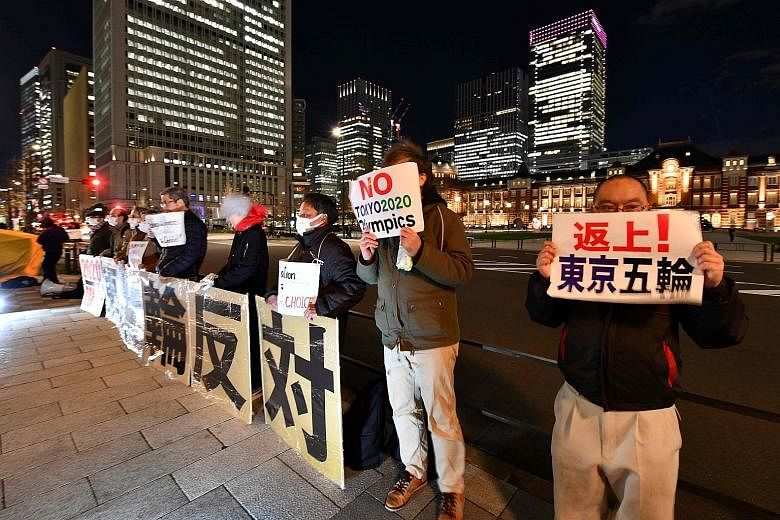The Tokyo 2020 Olympic and Paralympic Games have been postponed to next year in light of the global Covid-19 pandemic.
While the dates have not been fixed for the rescheduled Games, which will continue to be known as "Tokyo 2020", it was decided yesterday that the Games "will be held by the summer of 2021 at the latest".
The Olympics had been scheduled to be held from July 24 to August 9 this year, and the Paralympics, from Aug 25 to Sept 6.
The decision not to cancel the Games and not to hold it this year was made by Japanese Prime Minister Shinzo Abe and International Olympic Committee (IOC) president Thomas Bach over a teleconference call last night.
Mr Abe told reporters after the call that it "has become evident that it was impossible to host a full Olympics within this year", stressing the need to ensure athletes can compete under the best conditions and that spectators can watch the games safely.
The Games "must be rescheduled to a date beyond 2020 but not later than summer 2021, to safeguard the health of the athletes, everybody involved in the Olympic Games and the international community", the Tokyo 2020 Committee and IOC said in a joint statement last night.
The IOC was expected to convene an emergency board meeting last night, with the finer details of the postponement set to be ironed out over the next four weeks.
This is the first time since the modern Olympics began in 1896 that the sporting event has been postponed, though it was cancelled in 1916, 1940 and 1944 due to war.
The 1980 Moscow Games were boycotted by 65 nations, including China and the United States, in protest of the Soviet invasion of Afghanistan.
There has been mounting pressure on the IOC and Japan to postpone the Games in light of the Covid-19 pandemic, which the World Health Organisation said on Monday was "accelerating". More than 392,000 people have been infected worldwide, with more than 17,000 deaths.
Canada and Australia said they would withdraw from the Olympics were the event be held this summer.
Countries have been locked down, with major disruptions to athletes' training schedules.
Widespread travel restrictions also mean that scores of qualifying events have been cancelled. Only 57 per cent of athletes have confirmed their places at the Games.
Given the postponement, the Olympic torch relay will no longer flag off from Fukushima tomorrow.
But the Olympic flame, which had been lit on March 12 in Greece without spectators in light of the worsening outbreak, will remain in Japan, said the IOC and Tokyo 2020 in a joint statement.
"The Olympic Games in Tokyo could stand as a beacon of hope to the world during these troubled times," it said. "The Olympic flame could become the light at the end of the tunnel in which the world finds itself at present."
Mr Abe was joined on the teleconference call by Olympic Minister Seiko Hashimoto, Tokyo Governor Yuriko Koike, and Tokyo 2020 Organising Committee president Yoshiro Mori.
Organisers of two major events next year - the Fina World Aquatics Championships to be held in Fukuoka from July 16 to Aug 1, and the World Athletics Championships slated for Oregon in the United States from Aug 6 to 15 - have backed a rescheduled Games and intend to shift their dates.
Ms Hashimoto said she hopes the decision would bring certainty and reassurance to the athletes. A former sprint cyclist and skater who competed in four Winter and three Summer Games, she said she could empathise with the "considerable anxiety and difficulties in training to put on the best performance in a completely unknown situation".
Ms Koike said Tokyo is working out a new budget for the delayed Games, adding that the city will iron out the logistical issues including contractual venue obligations.
Decisions also have to be made for ticketing - Olympic tickets now have a no-refund policy - while new volunteers may need to be recruited.
With the dates still up in the air, Mr Mori did not rule out the possibility of the Games being held earlier than July next year, to avoid concerns over Japan's brutal summer.
He also did not rule out the off chance that the Olympic marathon could be brought back to Tokyo from Sapporo in northern Japan.











